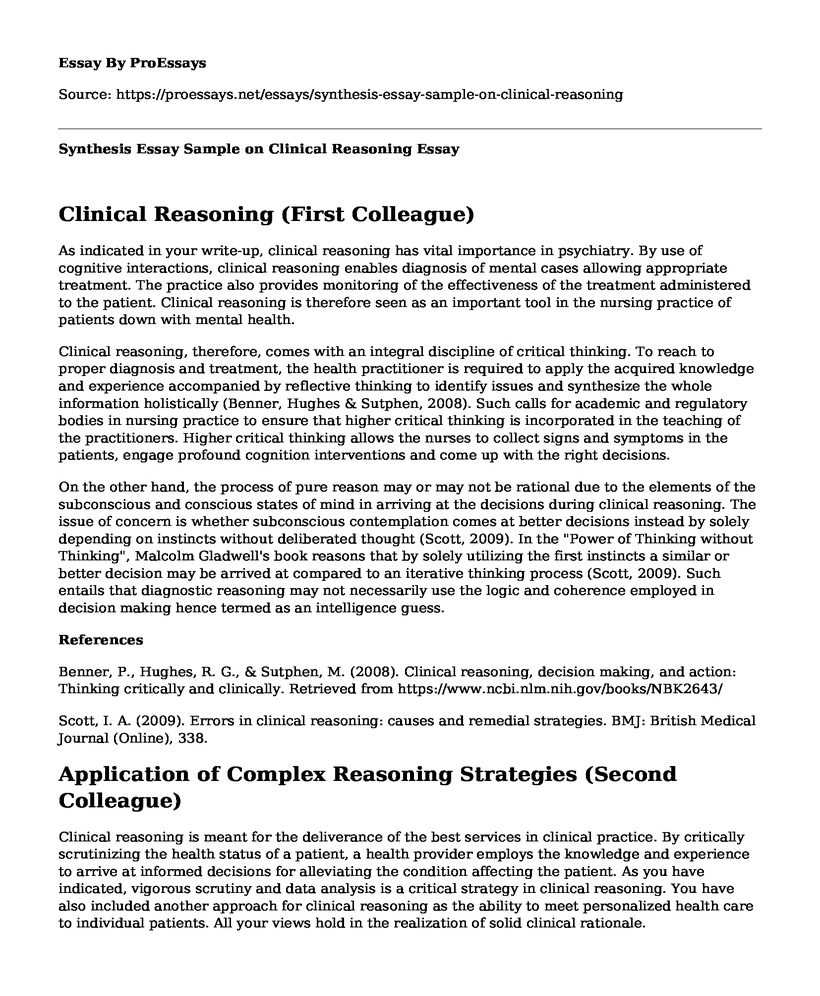Clinical Reasoning (First Colleague)
As indicated in your write-up, clinical reasoning has vital importance in psychiatry. By use of cognitive interactions, clinical reasoning enables diagnosis of mental cases allowing appropriate treatment. The practice also provides monitoring of the effectiveness of the treatment administered to the patient. Clinical reasoning is therefore seen as an important tool in the nursing practice of patients down with mental health.
Clinical reasoning, therefore, comes with an integral discipline of critical thinking. To reach to proper diagnosis and treatment, the health practitioner is required to apply the acquired knowledge and experience accompanied by reflective thinking to identify issues and synthesize the whole information holistically (Benner, Hughes & Sutphen, 2008). Such calls for academic and regulatory bodies in nursing practice to ensure that higher critical thinking is incorporated in the teaching of the practitioners. Higher critical thinking allows the nurses to collect signs and symptoms in the patients, engage profound cognition interventions and come up with the right decisions.
On the other hand, the process of pure reason may or may not be rational due to the elements of the subconscious and conscious states of mind in arriving at the decisions during clinical reasoning. The issue of concern is whether subconscious contemplation comes at better decisions instead by solely depending on instincts without deliberated thought (Scott, 2009). In the "Power of Thinking without Thinking", Malcolm Gladwell's book reasons that by solely utilizing the first instincts a similar or better decision may be arrived at compared to an iterative thinking process (Scott, 2009). Such entails that diagnostic reasoning may not necessarily use the logic and coherence employed in decision making hence termed as an intelligence guess.
References
Benner, P., Hughes, R. G., & Sutphen, M. (2008). Clinical reasoning, decision making, and action: Thinking critically and clinically. Retrieved from https://www.ncbi.nlm.nih.gov/books/NBK2643/
Scott, I. A. (2009). Errors in clinical reasoning: causes and remedial strategies. BMJ: British Medical Journal (Online), 338.
Application of Complex Reasoning Strategies (Second Colleague)
Clinical reasoning is meant for the deliverance of the best services in clinical practice. By critically scrutinizing the health status of a patient, a health provider employs the knowledge and experience to arrive at informed decisions for alleviating the condition affecting the patient. As you have indicated, vigorous scrutiny and data analysis is a critical strategy in clinical reasoning. You have also included another approach for clinical reasoning as the ability to meet personalized health care to individual patients. All your views hold in the realization of solid clinical rationale.
My only response is that human judgment is prone to errors and clinical reasoning is not an exception. A study in Texas Children's Hospital identified cognitive bias among the clinicians who participated in a human judgment exercise (Reeson, 2018). The Joint Commission attributes 20% of errors in diagnosis as errors in cognition (Reeson, 2018). Cognition biases therefore exist, and many clinicians may not be aware of them. In various researches, investigators have recognized an excess of thirty bias types that may lead to errors in health care diagnosis (Dovidio & Fiske, 2012). The most significant debate is the ways to lessen their effects as well as changing the ones that occur in our brains subconsciously.
Regarding the query on evidence-based practice in family-centered care, the participation of the family in the recovery plan of the patient is critical. When a patient, particularly a child, is sick in the hospital, the child needs its mother for a physical bond that has been shown to increase the family health and improve the healing process (Festini, 2014).
References
Dovidio, J. F., & Fiske, S. T. (2012). Under the radar: how unexamined biases in decision-making processes in clinical interactions can contribute to health care disparities. American journal of public health, 102(5), 945-952.
Festini, F. (2014). Family-centered care. In Italian journal of pediatrics (Vol. 40, No. 1, p. A33). BioMed Central.
Reeson, D. (2018). Cognitive Bias and How it Affects Health Care Providers' Decision Making. Children's hospital association. Retrieved from https://www.childrenshospitals.org/Newsroom/Childrens-Hospitals-Today/Summer-2018/Articles/Cognitive-Bias-and-How-it-Affects-Health-Care-Providers-Decision-Making
Cite this page
Synthesis Essay Sample on Clinical Reasoning. (2022, Nov 02). Retrieved from https://proessays.net/essays/synthesis-essay-sample-on-clinical-reasoning
If you are the original author of this essay and no longer wish to have it published on the ProEssays website, please click below to request its removal:
- Meth Epidemic
- Literature Review Example on Teens' Awareness of Periodontitis and Oral Health
- Essay Sample on Smoking Cessation Education Among Adults and the Elderly Patients in Primary Care Clinic, Houston
- Laws on Food: Food Regulations Essay Example
- Essay Sample on Childhood Obesity
- Attitudes of Cardiovascular Nurses Toward Evidence-Based Practice: A Descriptive Study in Turkey - Research Paper
- Essay Example on Prescription Drug Abuse: A Growing Public Health Crisis







